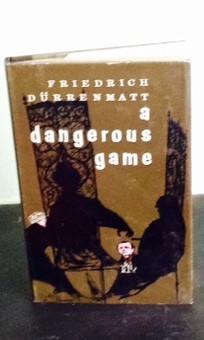Inspiring Older Readers
 posted on 05 Mar 2024
posted on 05 Mar 2024
A Dangerous Game by Friedrich Dürrenmatt
Dürrenmatt is one of those authors who I’ve been aware of since my university days but who I have never read – I’ve also never seen a production of any of his plays, for which he’s probably more famous than he is for his prose. In my mind he is one of the authors who occupies the slightly mysterious and generally ill-defined landscape I ascribe to mittel-European twentieth century literature. I would have been pushed , I think, to even offer a decent idea of when he was writing – as it happens, his key work was done in the post- second world war period, through to the mid-1960s. He died in 1990 but by that point his creative juices were not really running very freely, although he did produce a very effective and affecting ‘Speech for Vaclav Havel’ in the year of his death.
By a complete act of serendipity I found myself holding a copy of A Dangerous Game in my hands as I shifted books around to consider what I should read next. ‘Friedrich’, I thought, ‘your time has come’. It’s a very slim book too, so ideal for the short train journey I was about to take, and the level of commitment it represented was correspondingly slim. I needn’t have worried – it was a delightful read.
I’m not sure what makes something a novella as opposed to a short story but this felt distinctly to me like a short story beefed up by the design values of the hardback first edition published in 1960 by Jonathan Cape. There are a mere 99 pages in the book but a good half dozen of these are taken up with odd little decorative prints of flowers or bowls of fruit, wine cups etc. In reality this is more like a 60 page read once all the free end pages are taken into account. So there is very little time and space to build the story but Dürrenmatt does it so skilfully you feel that you’ve just read a full-blown novel. That, in my book, is top class writing.
The story itself is a modest little morality tale which at one level is an unremarkable insight into personal values in the public realm but at a more incisive level it is a commentary on the mores and ethics of 20th century capitalist society. A travelling sales representative who has just got himself a promotion and new car breaks down in a remote location and is offered a free nights accommodation at a lavish and comfortable private house owned by an ex-judge. The stay is free on the condition that the salesman, Traps, participates in an evening entertainment, allowing himself to be ‘tried’ by the judge and his retired legal friends – a defence lawyer, a prosecutor and a public hangman. The evening is marked out by the corpulent consumption of a huge feast and a positive cataract of wine during which Traps is ‘prosecuted’ for the murder of the man he has recently supplanted as the head salesman.
Traps is found guilty of the murder – by inducing a heart attack in his victim through deliberately humiliating him - and his ‘weapon’ is shown to be his sexual immorality. When passing the sentence the judge acknowledges that his guilt is in part obviated by the fact that he was behaving as society demands and as capitalism demands – finding himself caught-up in the ruthless pursuit of self-interest. This does not, the judge decides, merit a lighter sentence being passed because he is guilty and to push home this message Traps himself embraces his guilt. The drunken evening ends with Traps carrying out the death sentence himself by an unexpected act of suicide.
Dürrenmatt prefaces his story with some telling thoughts about the role of storytelling in world of post-war Europe and he concludes:
“And in our modern world there are only one or two feasible stories left, in which the fundamental nature of man can still be glimpsed in an ordinary face: in which some trifling misfortune accidentally impinges on the universal: and in which righteousness, justice and perhaps even grace, are still made manifest, caught for a fleeting instant in the monocle of a drunken old man.”
I'm not at all sure that there is a current paperback available and the hardback is relatively expensive - so it might be a case of keeping your eyes open for a copy ijn your local charity shop or second hand bookshop.
Terry Potter
March 2024